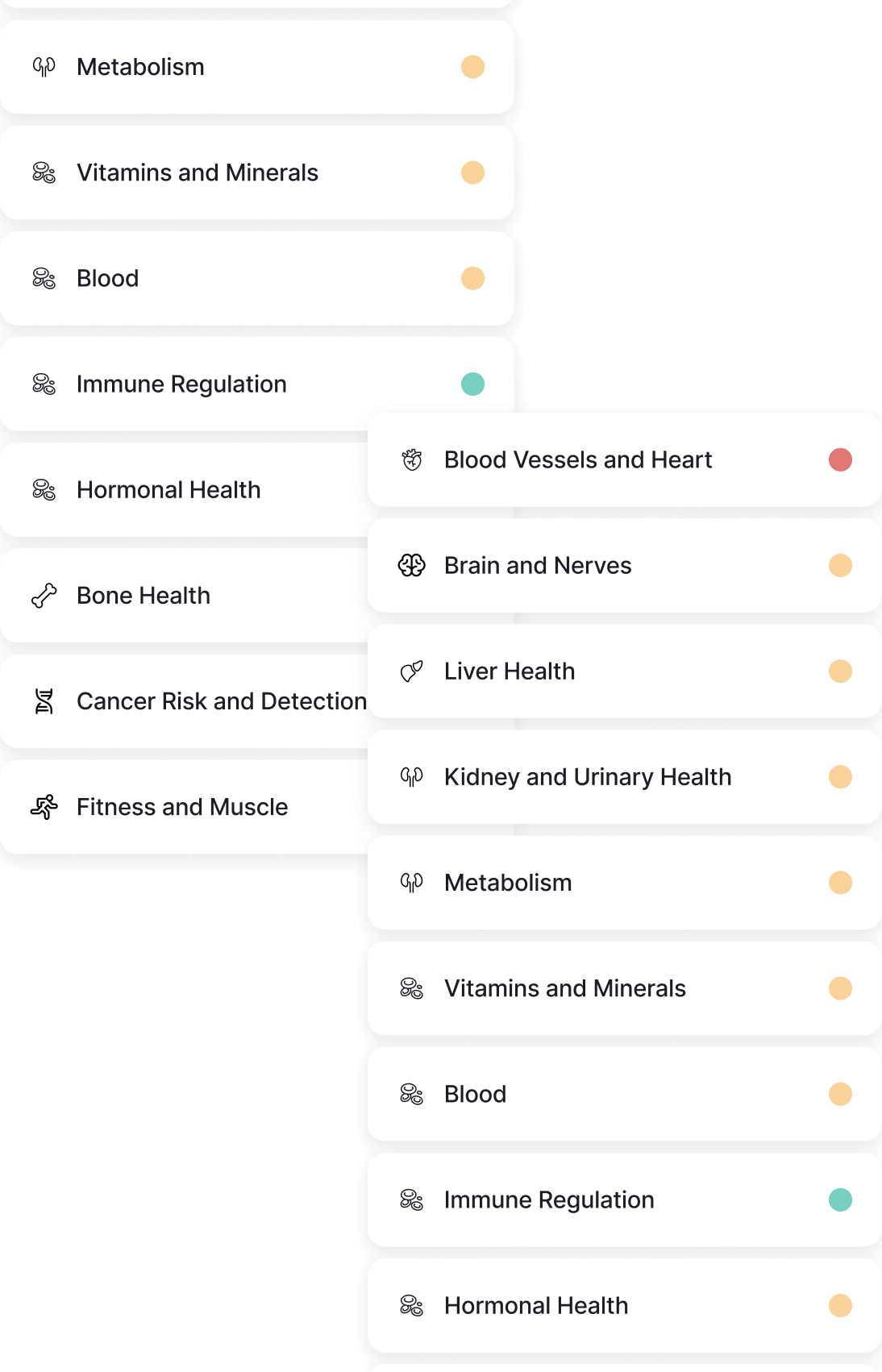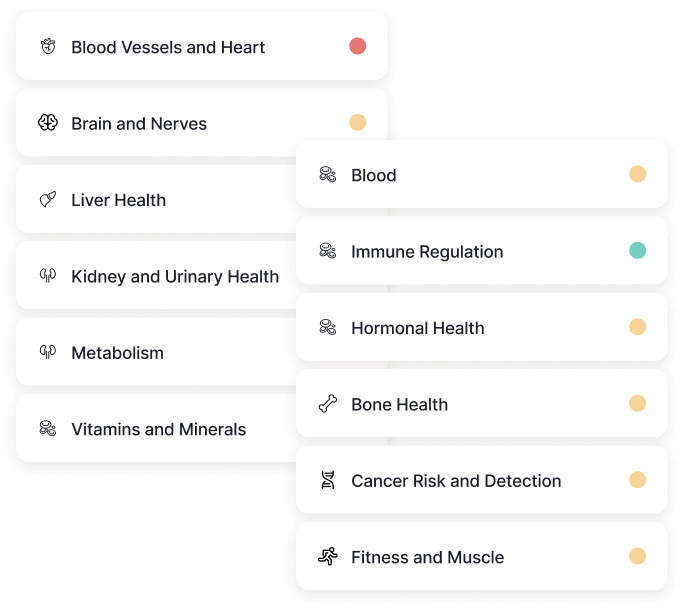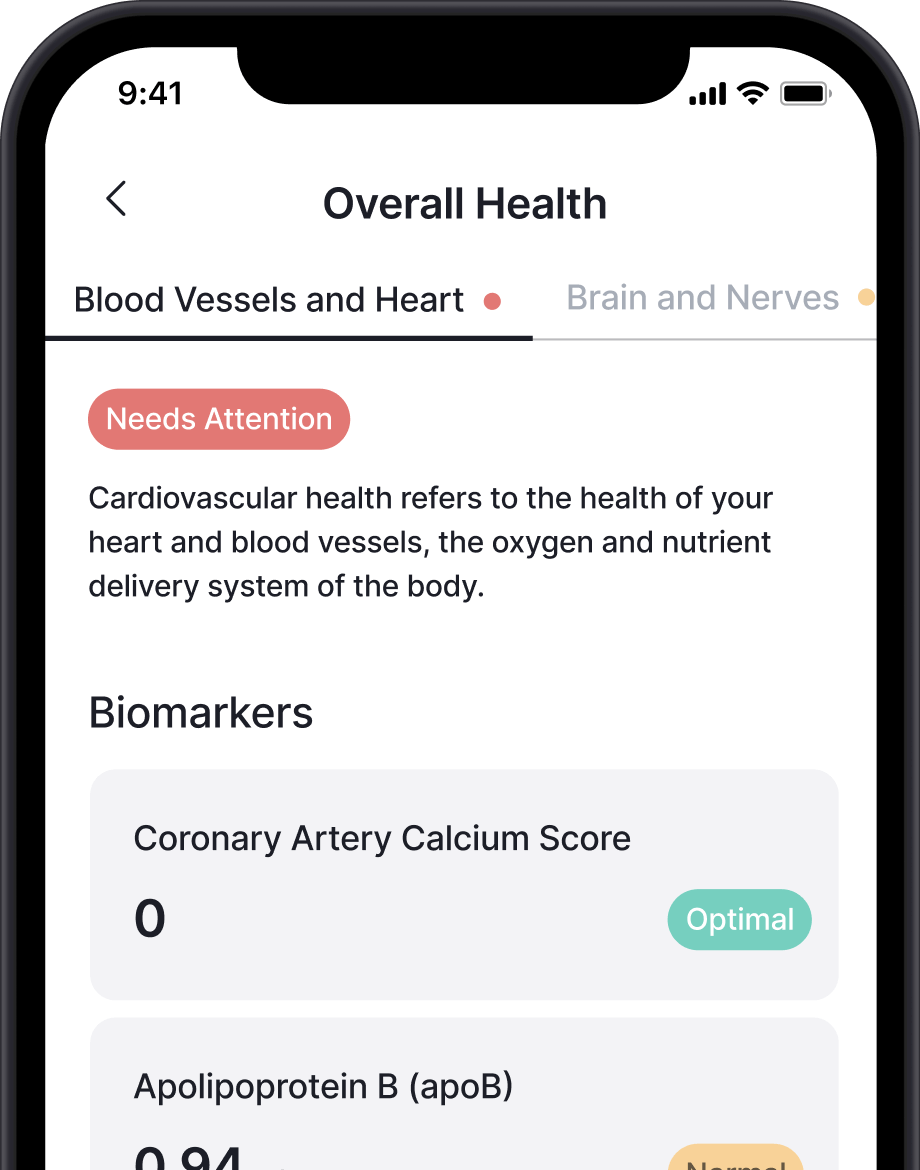健康长寿的第一步
NOVI Assessment Max goes beyond standard checkups with an in-depth, data-driven evaluation of over 100 biomarkers, two doctor consultations, and actionable insights to optimize your health longevity.



Our most comprehensive health longevity screening package.
Beyond standard diagnostics, NOVI Assessment Max tests over 100 biomarkers linked to metabolic health, hormones, systemic nutrients, and health longevity. Detect early disease indicators, including cancer, heart disease, and stroke, and receive personalized health and health longevity insights.



不是普通的健康检查
NOVI Assessment Max health longevity screenings are tailored to your specific needs, establishing a health baseline. Our services include multiple consultations with specialists: an initial consultation for tailored recommendations and a post-review assessment to understand your results and be properly guided on how to move forward. Our post-assessment care offers personalized recommendations based on your results, including customized dietary, exercise, and lifestyle programs.
您可以理解的结果。您可以立即采取的行动。
我们的用户友好型仪表板能让您清楚地了解筛查结果,优先考虑需要采取行动的关键领域,并提供个性化建议和健康计划。

Health longevity screening vs general health screening
Health longevity screeningOptimize your healthspan |
General health screeningOptimize your health today |
|
|---|---|---|
|
Detect diseases early
|
||
|
Identify risk of diseases
|
||
|
Track improvements over time
|
||
|
Biomarkers tested
|
100+ advanced
and standard biomarkers |
Standard
biomarkers |
|
Cardiovascular risk profile:
Lipoprotein (a), Apo B, Apo A1 |
||
|
Metabolic health profile:
Fasting insulin & glucose, HOMA-IR |
||
|
Nutritional deficiency profile:
Iron, magnesium, B12 & more |
||
|
Hormonal balance profile:
Men’s health, women’s health |
||
|
Tumour marker tests:
Ovary, prostate, pancreas, liver, colon & more |

基于科学的真知灼见。
NOVI Assessment Max 筛查结果附有代谢健康权威医生的循证见解。依靠以科学为基础的专业知识和实际行动,实现您的健康目标,最大限度地延长您的健康寿命。
忘掉年度筛查吧。
We go beyond a single test, tracking your results over time with routine assessments. This allows you to monitor changes and make improvements to your health as you follow a tailored action plan or program.

它是如何工作的?
Start of program
Consultation & lab tests
-
Consult a doctor for tailored recommendations (in-person or online)
-
血液检测
-
注重寿命的测量
Day 14 after lab tests
审查结果
-
在应用程序中查看结果
-
咨询医生
-
量身定制的建议
Month 1-6
重新测试
-
重新测试选定的标记,以衡量进展情况
-
与医生一起复查
*Retesting components, frequency, and costs depend on patient's screening results.
每年
每年对选定的评估重复一次
所含内容
综合测试
We test over 100 biomarkers, including hormones, thyroid, heart, and metabolic indicators, detecting early signs of thousands of diseases.
定期进度检查
Routine assessments monitor your health journey and progress. The retesting components and frequency will depend on the patient’s screening results and will be charged separately.
终生跟踪
Securely track lifetime results for ongoing understanding of your body’s changes.
Pre & Post-doctor Consults
Easy-to-read personalized insights presented on an intuitive platform and supported by curated doctor recommendations.
可操作的见解
区分正常和异常结果,跟踪随时间发生的变化,并接受改进建议。
Invest in yourself today. Take the first step towards your longest, healthiest life at $1,099.
Comprehensive Baseline Blood Work
Our carefully curated selection of 100+ biomarkers provide valuable insights into your health status.
-
载脂蛋白 A1(载脂蛋白 A1)
Measures the level of Apo A1, a protein component of HDL cholesterol. Higher levels of Apo A1 are associated with better cardiovascular health and lower risk of heart disease. -
载脂蛋白 B(载脂蛋白 B)
Apolipoprotein B is the primary protein component of low-density lipoproteins (LDL), which are often referred to as 'bad' cholesterol. Apo B is a crucial marker for assessing cardiovascular risk, as it indicates the number of atherogenic particles that can contribute to plaque buildup in arteries. Higher levels of Apo B are linked to an increased risk of atherosclerosis and cardiovascular disease. -
载脂蛋白 B/A1 比率
The ratio of Apo B to Apo A1 provides insight into the balance between atherogenic and anti-atherogenic particles. A higher ratio indicates increased cardiovascular risk, similar to the cholesterol/HDL ratio. -
胆固醇/高密度脂蛋白比率
The ratio of total cholesterol to HDL cholesterol is used to assess cardiovascular risk. A higher ratio indicates a greater risk of heart disease, as it suggests a higher level of bad cholesterol relative to good cholesterol. -
高密度脂蛋白胆固醇
Known as "good" cholesterol, HDL cholesterol helps remove excess cholesterol from the bloodstream, reducing the risk of heart disease. Higher HDL levels are generally associated with a lower risk of cardiovascular disease. -
High-Sensitivity C-Reactive Protein (hsCRP)
Measures the level of C-reactive protein in the blood, a marker of inflammation. Elevated hsCRP levels can indicate increased risk of cardiovascular diseases and other inflammatory conditions. -
同型半胱氨酸
Measures the level of homocysteine in the blood, an amino acid that can indicate cardiovascular risk when elevated. Homocysteine tests help assess heart health and identify potential risk factors for cardiovascular disease, impacting overall health and well-being. -
低密度脂蛋白胆固醇
Known as "bad" cholesterol, LDL cholesterol can build up in the walls of arteries, leading to atherosclerosis and increasing the risk of heart disease and stroke. Lowering LDL cholesterol levels is a key target in managing cardiovascular risk. -
脂蛋白(a)
A type of lipoprotein that carries cholesterol in the blood. High levels of lipoprotein (a) are associated with an increased risk of atherosclerosis and cardiovascular diseases. Unlike other lipids, lipoprotein (a) levels are largely determined by genetics. -
N-terminal pro-brain natriuretic peptide (NT-proBNP)
A marker for assessing heart health, particularly related to heart function and potential heart failure risk. -
总胆固醇
Measures the total amount of cholesterol in the blood, including low-density lipoprotein (LDL), high-density lipoprotein (HDL), and other lipid components. Used to assess the risk of heart disease, with higher levels indicating increased risk. Balancing cholesterol levels is important for cardiovascular health. -
甘油三酯
Triglycerides are the most common type of fat in the body that stores excess energy from one's diet. An accumulation of triglycerides means there is too much fat in the blood and may indicate higher risk of a cardiac event.
-
空腹血糖
Measures the level of glucose in the blood after fasting, which helps assess glucose metabolism and identify conditions like diabetes or prediabetes. Fasting glucose tests help monitor blood sugar control and metabolic health, impacting overall well-being and risk for diabetes complications. -
空腹胰岛素
Measures the level of insulin in the blood after fasting, which helps assess insulin sensitivity and glucose metabolism. Fasting insulin tests help identify insulin resistance or prediabetes, impacting overall metabolic health and risk for type 2 diabetes. -
血红蛋白 A1c (HbA1c)
Measures the average blood sugar level over the past two to three months, providing insight into long-term glucose control in people with diabetes. It is used to diagnose diabetes and assess the effectiveness of diabetes management plans. -
HOMA-IR
Estimates insulin resistance using fasting glucose and insulin levels. HOMA-IR tests help assess metabolic health and identify conditions like prediabetes or metabolic syndrome, impacting overall health and risk for type 2 diabetes and cardiovascular disease. -
磷酸盐
Phosphate is essential for bone health, energy metabolism, and cell function. Imbalances in phosphate levels can affect bone density, kidney function, and cardiovascular health. -
尿酸
Measures the level of uric acid in the blood, a waste product formed from the breakdown of purines. High levels can lead to gout and are associated with kidney stones and cardiovascular disease.
-
白蛋白
Measures the level of albumin in the blood, a protein produced by the liver that helps maintain fluid balance and transport hormones, vitamins, and drugs. Low albumin levels can indicate liver disease, kidney disease, or malnutrition. -
白蛋白/球蛋白比率
The ratio of albumin to globulin helps assess liver and kidney function and overall protein balance in the body. Abnormal ratios can indicate liver disease, kidney disease, or immune disorders. -
碱性磷酸酶(ALP)
Measures the level of ALP, an enzyme found in the liver, bones, and other tissues. Elevated levels can indicate liver disease, bone disorders, or bile duct obstruction. -
天冬氨酸转氨酶(AST)
Measures the level of AST, an enzyme found in the liver and heart. Elevated AST levels can indicate liver damage or heart problems, helping diagnose conditions like hepatitis or heart attack. -
γ-谷氨酰转胺酶(GGT)
Measures the level of GGT, an enzyme found in the liver and bile ducts. Elevated GGT levels can indicate liver disease or bile duct obstruction and are often used to assess liver function and alcohol consumption. -
球蛋白
Measures the level of globulin proteins in the blood, which are involved in immune function and blood clotting. Imbalances can indicate liver disease, kidney disease, or immune disorders. -
Hepatitis A Antibody (HAV Total)
Measures the presence of antibodies against hepatitis A in the blood, indicating past or current infection or immunity. HAV Total tests help assess liver health and identify potential infections, impacting overall health and well-being. -
Hepatitis B Antibody
Measures the presence of antibodies against hepatitis B surface antigen in the blood, indicating immunity to hepatitis B. Hepatitis Bs Ab tests help assess immunity status and guide vaccination strategies, impacting overall health and well-being. -
Hepatitis B Antigen
Hepatitis B surface antigen (HBsAg) is a protein on the surface of the hepatitis B virus (HBV) that indicates an active infection. Measuring HBsAg is crucial for diagnosing acute or chronic hepatitis B and assessing infectivity. -
Lactate dehydrogenase (LDH)
LDH is an enzyme that plays a role in cellular energy production. Abnormal levels may indicate tissue damage or inflammation, which can impact recovery, energy levels, and overall health. -
总胆红素
Measures the level of bilirubin in the blood, a waste product from the breakdown of red blood cells. High levels can indicate liver dysfunction or hemolysis and are associated with jaundice. -
总蛋白质
Measures the total amount of protein in the blood, including albumin and globulin. It reflects nutritional status and helps evaluate kidney and liver function. Total protein levels can indicate various conditions affecting protein synthesis, breakdown, and loss.
-
调整后的钙
Measures the level of calcium in the blood, adjusted for albumin levels. It provides a more accurate assessment of calcium status, especially in individuals with abnormal albumin levels, to better evaluate calcium balance and associated health risks. -
白蛋白 - 尿液(微量白蛋白)
Measures the level of albumin in the urine, an indicator of kidney function. Elevated levels can suggest early kidney damage, particularly in people with diabetes or hypertension. -
白蛋白/肌酐比值 - 尿液
Measures the ratio of albumin to creatinine in urine, assessing kidney function and detecting early kidney damage. -
重碳酸盐
Measures the level of bicarbonate in the blood, an indicator of the body's acid-base balance. Abnormal levels can suggest metabolic acidosis or alkalosis, often linked to kidney or respiratory disorders. -
钙
Measures the level of calcium in the blood, essential for bone health, muscle function, nerve transmission, and blood clotting. Abnormal levels can indicate bone disorders, parathyroid gland dysfunction, or kidney disease. -
氯化物
Measures the level of chloride in the blood, an electrolyte that helps maintain fluid balance and acid-base balance in the body. Abnormal levels can indicate dehydration, kidney dysfunction, or acid-base imbalances. -
肌酐
Measures the level of creatinine in the blood, a waste product produced by muscle metabolism. It is a key indicator of kidney function, with elevated levels suggesting impaired kidney function or kidney disease. -
肌酸酐 - 尿液
Measures the level of creatinine in the urine, a waste product of muscle metabolism. It helps assess kidney function and is often used in conjunction with blood creatinine levels to evaluate kidney health. -
估计肾小球滤过率(eGFR)
Estimates the rate at which the kidneys filter waste from the blood, an important indicator of kidney function. A low eGFR can suggest kidney dysfunction or chronic kidney disease, requiring early intervention to prevent progression. -
钾
Measures the level of potassium in the blood, an electrolyte critical for nerve function, muscle contraction, and heart function. Abnormal levels can indicate kidney dysfunction, dehydration, or adrenal disorders, impacting cardiovascular health and muscle function. -
钠
Measures the level of sodium in the blood, an electrolyte important for fluid balance, nerve function, and muscle contractions. Abnormal sodium levels can suggest dehydration, kidney dysfunction, or adrenal gland issues, impacting overall fluid and electrolyte balance. -
尿素
Measures the level of urea in the blood, a waste product formed from protein metabolism. It helps assess kidney function and hydration status, with elevated levels indicating possible kidney dysfunction or dehydration.
-
嗜碱性粒细胞(百分比和绝对值)
Measures the absolute count of basophils, a white blood cell involved in inflammatory responses and allergies. -
嗜酸性粒细胞(百分比和绝对值)
Measures the percentage and absolute count of eosinophils, a type of white blood cell involved in allergic reactions and defense against parasitic infections. Eosinophil levels help assess allergic or parasitic conditions and guide treatment plans. -
淋巴细胞(百分比和绝对值)
Measures the percentage and absolute count of lymphocytes, a type of white blood cell involved in immune response to viral infections and chronic diseases. Lymphocyte levels help assess immune function and identify potential viral infections or immune disorders. -
单核细胞(百分比和绝对值)
Measures the percentage and absolute count of monocytes, a type of white blood cell involved in phagocytosis and immune response to infections. Monocyte levels help assess immune function and identify potential infections or inflammatory conditions. -
中性粒细胞(百分比和绝对值)
Measures the percentage and absolute count of neutrophils, a type of white blood cell that is the first line of defense against bacterial infections. Neutrophil levels help assess immune response and identify potential infections or inflammatory conditions. -
白细胞(WBC)计数
Measures the number of white blood cells in the blood, which are key components of the immune system that help fight infections and inflammation. Abnormal levels can indicate infection, inflammation, or bone marrow disorders, impacting immune response and overall health.
-
血红蛋白
Measures the amount of hemoglobin in the blood, a protein in red blood cells responsible for carrying oxygen. Hemoglobin levels help assess oxygen transport capacity and identify conditions like anemia or polycythemia, impacting energy levels and overall health. -
血细胞比容
Measures the percentage of blood volume occupied by red blood cells. Hematocrit levels help assess oxygen-carrying capacity and identify conditions like anemia or polycythemia, impacting energy levels and overall health. -
平均肌体血红蛋白 (MCH)
Measures the average amount of hemoglobin in a single red blood cell. MCH levels help classify types of anemia and provide insight into underlying causes, impacting overall health and energy levels. -
平均肌体血红蛋白浓度 (MCHC)
Measures the average concentration of hemoglobin in red blood cells. MCHC levels help classify types of anemia and provide insight into underlying causes, impacting overall health and energy levels. -
平均体液容积 (MCV)
Measures the average size of red blood cells. MCV levels help classify types of anemia and provide insight into underlying causes, such as nutrient deficiencies or bone marrow disorders, impacting overall health and energy levels. -
血小板计数
Measures the number of platelets in the blood, which are essential for blood clotting and wound healing. Abnormal platelet levels can indicate bleeding disorders, bone marrow problems, or autoimmune conditions, impacting the body's ability to prevent excessive bleeding. -
红细胞分布宽度 (RDW)
Measures the variation in size of red blood cells. RDW levels help diagnose types of anemia and provide insight into underlying causes, impacting overall health and energy levels. -
红细胞 (RBC) 计数
Measures the number of red blood cells in the blood, which are responsible for carrying oxygen from the lungs to the rest of the body. RBC levels help assess oxygen-carrying capacity and identify conditions like anemia or polycythemia, impacting overall health and energy levels. -
白细胞(WBC)计数
Measures the number of white blood cells in the blood, which are key components of the immune system that help fight infections and inflammation. Abnormal levels can indicate infection, inflammation, or bone marrow disorders, impacting immune response and overall health.
-
外观
Evaluates the visual characteristics of urine, such as color and clarity, which can provide insight into hydration status, kidney function, and potential health issues. Abnormal urine appearance can indicate dehydration, infections, or metabolic disorders, impacting overall health and well-being. -
细菌
Detects the presence of bacteria in urine, which can indicate bacterial infection in the urinary tract. Positive bacteria tests help assess urinary tract health and identify potential infections, impacting overall health and well-being. -
胆红素
Measures the level of bilirubin in the urine, which can indicate liver dysfunction or hemolysis. Detecting bilirubin in urine helps assess liver health and identify potential liver damage or disease, impacting overall health and well-being. -
颜色
Evaluates the color of urine, which can provide insight into hydration status, kidney function, and potential health issues. Abnormal urine color can indicate dehydration, liver disease, or metabolic disorders, impacting overall health and well-being. -
Cotinine
Cotinine, a nicotine metabolite, indicates recent tobacco exposure. -
上皮细胞
Measures the presence of epithelial cells in urine, which can indicate infection, inflammation, or contamination. The presence of epithelial cells helps assess urinary tract health and identify potential issues affecting the kidneys or bladder, impacting overall health and well-being. -
葡萄糖
Measures the level of glucose in the urine, which can indicate elevated blood sugar levels, kidney dysfunction, or diabetes. Detecting glucose in urine helps assess blood sugar control and kidney health, impacting overall metabolic health. -
酮类
Measures the level of ketones in the urine, which can indicate fat metabolism or uncontrolled diabetes. Detecting ketones helps assess metabolic health and identify potential issues with blood sugar control or dietary practices, impacting overall health and well-being. -
白细胞
Detects the presence of leukocyte esterase, an enzyme found in white blood cells, in urine. This can indicate infection or inflammation in the urinary tract or kidneys. Positive leukocyte tests help assess urinary tract health and identify potential infections, impacting overall health and well-being. -
亚硝酸盐
Detects the presence of nitrites in urine, which can indicate bacterial infection in the urinary tract. Positive nitrite tests help assess urinary tract health and identify potential infections, impacting overall health and well-being. -
pH 值
Measures the acidity or alkalinity of urine, reflecting kidney function and metabolic status. Abnormal urine pH levels can indicate kidney stones, urinary tract infections, or metabolic disorders, impacting overall health and well-being. -
蛋白质
Measures the level of protein in the urine, which can indicate kidney dysfunction or other health conditions. Elevated urine protein levels help assess kidney health and identify potential kidney damage, impacting overall health and well-being. -
红细胞(RBC)
Measures the presence of red blood cells in urine, which can indicate bleeding or injury in the urinary tract or kidneys. Detecting RBCs in urine helps assess urinary tract health and identify potential injuries or conditions affecting the kidneys, impacting overall health and well-being. -
比重
Measures the concentration of urine, reflecting kidney function and hydration status. Abnormal specific gravity levels can indicate dehydration, kidney dysfunction, or diabetes insipidus, impacting fluid and electrolyte balance in the body. -
白细胞(WBC)
Measures the presence of white blood cells in urine, which can indicate infection or inflammation in the urinary tract or kidneys. Detecting WBCs in urine helps assess urinary tract health and identify potential infections or inflammatory conditions, impacting overall health and well-being.
-
促甲状腺激素(TSH)
Measures the level of TSH in the blood, which regulates thyroid function by stimulating the production of thyroid hormones. Abnormal TSH levels can indicate thyroid dysfunction, impacting metabolism, energy levels, and overall health. -
游离甲状腺素(T4)
Measures the level of free T4, the inactive form of thyroid hormone, in the blood. Free T4 levels help assess thyroid function and identify potential thyroid disorders, impacting metabolism, energy levels, and overall health. -
游离三碘甲状腺原氨酸 (T3)
Measures the level of free T3, the active form of thyroid hormone, in the blood. Free T3 levels help assess thyroid function and identify potential thyroid disorders, impacting metabolism, energy levels, and overall health.
-
甲胎蛋白(肝)
Measures the level of AFP, a protein that can be elevated in certain types of cancer, including liver and testicular cancer. AFP tests help assess cancer progression, treatment response, and recurrence, impacting overall health and well-being. -
CA 19-9 (Pancreas)
Measures the level of CA 19-9, a protein often elevated in certain types of cancer, including pancreatic, gallbladder, and bile duct cancer. CA 19-9 tests help assess cancer progression, treatment response, and recurrence, impacting overall health and well-being. -
癌胚抗原(结肠)
Measures the level of CEA, a protein often elevated in certain types of cancer, including colorectal, lung, and breast cancer. CEA tests help assess cancer progression, treatment response, and recurrence, impacting overall health and well-being. -
EBV IgA (Nose)
Measures the level of IgA antibodies against Epstein-Barr virus in the blood, indicating past or current infection. EBV IgA tests help assess immune response and identify potential infections, impacting overall health and well-being. -
Hepatitis A Antibody (HAV Total)
Measures the presence of antibodies against hepatitis A in the blood, indicating past or current infection or immunity. HAV Total tests help assess liver health and identify potential infections, impacting overall health and well-being. -
Hepatitis B Antibody
Measures the presence of antibodies against hepatitis B surface antigen in the blood, indicating immunity to hepatitis B. Hepatitis Bs Ab tests help assess immunity status and guide vaccination strategies, impacting overall health and well-being. -
Hepatitis B Antigen
Hepatitis B surface antigen (HBsAg) is a protein on the surface of the hepatitis B virus (HBV) that indicates an active infection. Measuring HBsAg is crucial for diagnosing acute or chronic hepatitis B and assessing infectivity. -
PSA (Prostate) / CA 125 (Ovaries)
PSA is a protein produced by the prostate gland. Elevated PSA levels can indicate prostate cancer or other prostate conditions. PSA tests help assess prostate health, cancer progression, and treatment response, impacting overall health and well-being. CA 125 is a protein often elevated in ovarian cancer and other conditions. CA 125 tests help assess cancer progression, treatment response, and recurrence, impacting overall health and well-being. -
Stool Occult Blood
Detects hidden blood in urine or stool, which may indicate internal bleeding, kidney issues, or colon cancer.
-
B12
Measures the level of vitamin B12 in the blood, an essential nutrient for red blood cell formation, nerve function, and DNA synthesis. Vitamin B12 tests help assess nutritional status and identify deficiencies, impacting energy levels, neurological health, and overall well-being. -
铁蛋白
Measures the level of ferritin, a protein that stores iron in the body. Ferritin tests help assess iron stores and diagnose conditions like iron deficiency anemia or hemochromatosis, impacting overall energy levels and health. -
叶酸
Measures the level of folate (vitamin B9) in the blood, a crucial nutrient for DNA synthesis, red blood cell formation, and neural tube development during pregnancy. Folate tests help assess nutritional status and identify deficiencies, impacting overall health and fetal development during pregnancy. -
铁
Measures the level of iron in the blood, a vital component of hemoglobin in red blood cells, essential for oxygen transport. Iron tests help assess nutritional status, identify anemia or iron overload, and impact overall energy levels and health. -
铁结合能力
Measures the blood's capacity to bind and transport iron, indicating the amount of transferrin, a protein that binds iron. This test helps assess iron status and differentiate between types of anemia, impacting overall energy levels and health. -
铁饱和度
Measures the percentage of transferrin that is saturated with iron, providing insight into iron availability and storage. This test helps assess iron status and guide treatment for anemia or iron overload conditions. -
镁
Measures the level of magnesium in the blood, an essential mineral involved in muscle function, nerve transmission, and energy production. Magnesium tests help assess nutritional status and identify potential deficiencies, impacting overall health and well-being. -
维他命 D
Measures the level of vitamin D in the blood, essential for bone health, immune function, and overall well-being. Adequate levels help maintain calcium and phosphate balance in the body, supporting bone density and health. -
锌
Measures the level of zinc in the blood, an essential mineral involved in immune function, wound healing, and DNA synthesis. Zinc tests help assess nutritional status and identify potential deficiencies, impacting overall health and well-being.
-
促卵泡激素(FSH)
Measures the level of FSH, a hormone involved in the regulation of reproductive processes in both men and women. FSH tests help assess fertility status, ovarian function in women, and testicular function in men, impacting overall reproductive health and hormonal balance. -
睾酮,总量
Measures the total level of testosterone, a hormone important for male reproductive health, muscle mass, bone density, and mood regulation. Testosterone tests help assess hormonal status and identify conditions like hypogonadism or hormonal imbalances, impacting overall health and well-being in both men and women.
The Lucence INSIGHT Multicancer Early Detection (MCED) test uses a single blood test to detect multiple cancers by identifying DNA fragments shed by cancer cells into the bloodstream.
The LucenceINSIGHT 5 test checks for 5 different types of cancer, including:
-
Thyroid cancer
-
Lung cancer
-
Liver cancer
-
Pancreatic cancer
-
Colorectal cancer
- EBV IgA
- CEA
- 法新社
- CA 19-9
- PSA / CA 125
- 空腹胰岛素
- 空腹血糖
- HOMA-IR
- 同型半胱氨酸
常见问题
-
NOVI Assessment Max 包括一系列全面的实验室检测,超出了标准健康检查套餐中的常规检测项目。
NOVI Assessment Max also tests across 100+ biomarkers related to metabolic health, hormones, and systemic nutrients as well as longevity measures. With these, you can uncover early indicators of diseases including cancer, heart disease, and stroke and get a precise indication of where you are on your journey to optimal health.
-
Health longevity-focused measurements are health metrics and biomarkers that provide insights into your potential lifespan and overall health quality.
-
Our comprehensive blood test and diagnostic covers 100+ biomarkers related to metabolic health, hormones, and systemic nutrients as well as longevity measures.
-
NOVI Assessment Max 专为希望了解和跟踪自身健康状况的各种背景和健康状况的个人而设计。这种积极主动的长期健康方法对每个人都有益。通过一套测试结果来确定您的基线,有助于您监测身体的变化趋势,掌控健康的未来。
-
对患者而言,综合测试历来具有挑战性,包括解读难以理解的 PDF 文件、在线搜索结果解释、手动跟踪趋势,以及在计费前处理未知成本。NOVI Assessment Max 简化了这一过程,提供透明的价格、可操作的见解以及NOVI Health 医生根据您的结果推荐的解决方案。我们还提供一系列个性化方案,全面支持您的健康目标。
-
Your results will be available in one week, and your doctor will go over your report in detail during your review appointment. Additionally, you will be able to access your results in our mobile app after the consultation to assist you in monitoring your progress over time.
-
Yes, you will receive a doctor’s review along with your results.
-
You will have two consultations with your doctor. The first will take place during your initial visit, where your doctor will provide personalized recommendations for healthy longevity testing.
Once your results are ready, you will have a one-on-one follow-up consultation to review them in detail.
-
您可以向NOVI Health 的医生咨询并查看结果:
Sue Anne Toh 博士,内分泌学高级顾问专家,硕士,英国剑桥大学 MBBChir,ABIM(国际医学,内分泌学)。
Kyle Tan 博士,预防医学专家顾问,医学学士,公共卫生硕士,FAMS。
Todd On 博士,副顾问,全科医生,医学学士,GDFM,MMED (FM),MCFP (S)。
杨俊杰医生,全科医生,医学博士,GDFM。
-
You can book an appointment for NOVI Assessment Max here.
-
您的血液检测和诊断将在NOVI 健康诊所进行:
160 Robinson Road #03-01
Mediplex @ SBF Center
Singapore 068914
